
Written by Maia, President
I hear from a lot of desperate parents whose babies and kids suffer from eczema. An estimated 10-20% of infants and kids have eczema nowadays. Maybe there is more awareness about it now (when I was a kid, we probably often passed it off as a bad case of “dry skin”), or maybe it is occurring more frequently in the population. Regardless, eczema is driving many of you crazy, and the eczema experience often becomes a physical and emotional ordeal for the whole family.
Parents I hear from are usually worried about two things—first, what’s causing the eczema, and second, what are the most effective natural eczema treatments for babies and kids? I can’t relate personally because my sons haven’t had eczema (although my oldest is allergic to peanuts, and allergies and eczema often go hand-in-hand), but I’ve listened to a lot of people on the front lines and done research.
In this post, I share what I hope are helpful perspectives and strategies, including a method developed by engineers with a suffering baby, pro tips from the genius herbalist at Green Goo (formerly Sierra Sage), and natural eczema treatments that we crowd-sourced from you, our community of readers.
 What Is Eczema?
What Is Eczema?
Eczema is an umbrella term for a group of conditions involving irritated, inflamed skin. Itchiness is common, and babies with eczema often have crusty, oozy patches. Eczema often shows up in the first six months of life.
There are several different types of eczema and therefore many potential solutions (though conventional wisdom says that eczema can be controlled or treated, but not cured). As you probably already know, figuring out what’s going on with your child’s eczema can be a long process that involves a lot of guesswork and experimentation.
But Won’t My Kid Outgrow It?
Friends and health professionals (and the internet) may tell you that your child will outgrow eczema. This is probably nice to hear, and it is partially true; many kids with eczema do eventually stop having symptoms as they get older. But although the eczema may go away, the underlying problems that caused it can reappear as long-term issues like seasonal allergies (hay fever) and asthma.
You may have noticed that eczema tends to run in families with histories of these conditions. It’s not a coincidence; an allergy-prone immune system is the common thread. Eczema, hay fever and asthma are known as the “atopic triad.”
What Causes Eczema?
Eczema is generally understood as a symptom of the immune system reacting to an irritant. Sound vague? This is because eczema is a broad term that describes a wide variety of skin problems with different origins. Also, even the same type of eczema can affect people in different ways. Eczema is complicated.
The Detergent Theory
I wasn’t totally satisfied by the mainstream explanations (or lack thereof) for what causes eczema. Then a client of mine led me to an intriguing theory by a parent-activist named A.J. Lumstaine.
In the early 2000s, A.J. and her husband had a baby with a bad case of eczema, and conventional treatments weren’t helping. A.J. and her husband are both engineers, so they applied their engineering minds to the problem and eventually discovered that their son was sensitive to detergents. Not just laundry and dish detergents, but the category of chemicals known as detergents.
Detergents can be derived from either petroleum or plant sources and have become ubiquitous in all kinds of products—from personal care products to household products to even foods—since the 1970s. Detergents are not in and of themselves bad—some are toxic, and some are benign. But it seems that for some people, detergents are the cause–or at least an exacerbating factor—for eczema.
According to A.J.’s theory of “detergent-reactive eczema,” synthetic detergents can compromise the skin’s natural barrier, making it more permeable. Increased permeability means that stuff outside the body, which normally couldn’t get in, can now penetrate the skin, causing the immune system to develop new sensitivities. As a result, exposure to mold, pollen, bacteria, household dust, pet dander, etc., may cause an eczema flare-up.
Increased permeability of the skin also means that stuff inside the body–like its natural moisture–can get out, leading to dryness. Super sensitive, dry skin is the hallmark of eczema.
A.J. started a website in the early 2000s to share her family’s story and the results of the exhaustive research and experimentation they’ve done. She developed an eczema solution that she calls “simple but not easy” because it involves removing all detergents and detergent residues from your home environment—including the products that all members of the family use. It’s a big undertaking, but it’s worth considering if your child is suffering and you’re still searching for answers.
A.J. believes that detergent-reactive eczema accounts for 20-40% of eczema cases in infants. Removing detergents can help kids suffering from other kids of eczema, too. A.J. also shares information and solutions related to these other types of eczema on her website.
Natural Eczema Treatments
Regardless of whether you’re able to eventually “solve” your kid’s eczema like the Lumstaines did, you’ll still have some symptoms to deal with. Here is a compilation of (mostly) natural eczema treatments based on our research and the hard-earned wisdom of some of our readers:
• 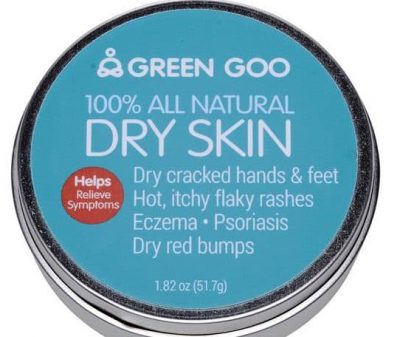 Try a medicinal balm: Conventional eczema treatment involves steroid creams (for inflamed patches), antibiotics (for skin infections), and moisturizers (for dryness). A well-formulated medicinal balm, like Dry Skin Care from Green Goo (formerly Sierra Sage), can hit all these bases without the yucky ingredients and side effects. (See below for more information on why Dry Skin Care has a cult following among people dealing with eczema, and some pro tips on how to use it.)
Try a medicinal balm: Conventional eczema treatment involves steroid creams (for inflamed patches), antibiotics (for skin infections), and moisturizers (for dryness). A well-formulated medicinal balm, like Dry Skin Care from Green Goo (formerly Sierra Sage), can hit all these bases without the yucky ingredients and side effects. (See below for more information on why Dry Skin Care has a cult following among people dealing with eczema, and some pro tips on how to use it.)
• Try coconut oil or shea butter: One reader said her friend had excellent results when she used organic extra virgin cold pressed coconut oil on her son’s skin. Coconut oil is good for eczema because it has moisturizing, anti-microbial, anti-fungal, and anti-inflammatory properties. Another natural wonder with similar properties is shea butter. Look for shea butter that is 100% natural and unrefined.
• Use a gentle soap/shampoo: Several of you wrote in to give the name of what you feel is the best soap for eczema. These include Ruby-Blue Bunny Shampoo & Wash, Babo Botanicals products, and Beautycounter’s new line of baby products. Just be aware that most of these DO contain a detergent of some kind, even if it’s a safe one. Most of you know to avoid sodium laureth sulfate and sodium lauryl sulfate, but what about the newer “coconut-derived” detergents like decyl glucoside? While studies suggest this ingredient is safe, it still falls in the “detergent” category. Which is why you might want to try this next suggestion if you’re still battling eczema after using gentler soaps…
•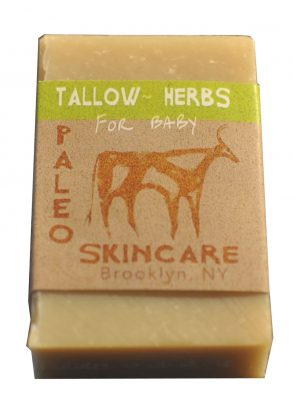 Use old-fashioned soap: The best soap for eczema is made with simple, natural ingredients. Our tallow-based soap for babies is formulated for sensitive skin and can be used for both skin and hair. If you’re trying to rid even your clothing of detergent residue, try Tandi’s tallow-based laundry powder, which is made of old fashioned soap, not detergent. (If you like liquid laundry soap, here’s a good one that’s free of detergent.) Another popular real soap company is Dr. Bronner’s, which my mom used to wash her hair, dishes, and even her car in the 1970s!
Use old-fashioned soap: The best soap for eczema is made with simple, natural ingredients. Our tallow-based soap for babies is formulated for sensitive skin and can be used for both skin and hair. If you’re trying to rid even your clothing of detergent residue, try Tandi’s tallow-based laundry powder, which is made of old fashioned soap, not detergent. (If you like liquid laundry soap, here’s a good one that’s free of detergent.) Another popular real soap company is Dr. Bronner’s, which my mom used to wash her hair, dishes, and even her car in the 1970s!
• Apply a lotion immediately after bath time: I’m not a fan of the ingredients, but one of our readers swears by Aquaphor to lock in moisture. Another reader gets good results with Babo Botanical’s Moisturizing Lotion, which has an ingredients list that I approve of. Others have had luck with Beautycounter’s Baby Daily Protective Balm and Baby Soothing Oil.
• Try urine therapy: Yep, you read that right. Urine, which contains urea, along with enzymes, hormones, minerals, etc., can help treat eczema and other skin conditions. One mom shared with us that her daughter’s skin improved when she started applying a cotton round saturated with her daughter’s urine to the affected skin, followed a few hours later by Medicine Mama’s Bee Magic. The pee really worked; Medicine Mama’s Bee Magic didn’t have any effect on its own. It makes sense that urine would help with eczema, because urea is a common ingredient in cosmetic products thanks to its moisturizing and exfoliating properties.
• Use only natural laundry detergent: Natural laundry detergents do the job without harsh chemicals that can irritate skin. Make sure you use natural detergent for everyone’s clothes and all of your household linens. As I mentioned above, if you’re looking for a soap-based (detergent-free) laundry option, you might try our best-selling Tandi’s Naturals Concentrated Laundry Soap or MamaSuds detergent-free liquid soap.
• Soften water: Some research from Europe and other countries suggests a link between hard water and eczema. Soft water alone might not fix an eczema problem, but it can be part of an effective treatment plan (and may help prevent eczema in the first place). One of our readers saw a dramatic improvement in her son’s eczema, in less than a week, when they installed a water softener, started using Babo lotion, and switched to Green Shield laundry detergent.
Natural Eczema Treatment Tips from a Pro

Jen Scott of Green Goo
Just about every approach to eczema treatment—natural or conventional–involves some kind of topical treatment. Our most popular product for treating eczema is Dry Skin Care from Green Goo (formerly Sierra Sage). We talked with Jen Scott, owner of Green Goo and the genius herbalist behind its products, to find out more about Dry Skin Care and get her tips on how to treat eczema with the medicinal ointment.
In Traditional Chinese Medicine and Ayurveda, eczema is seen as a condition involving heat. So oils that have neutral qualities, rather than warming ones, help soothe affected skin. Jen chose neutral olive oil, sunflower oil, and jojoba oil as the base for Dry Skin Care.
But it’s the calendula flowers in Dry Skin Care that Jen calls “the powerhouse” of her formula. Calendula helps soothe and heal eczema patches thanks to a combination of anti-inflammatory, anti-fungal, anti-yeast, and other anti-microbial properties. Jen believes so strongly in Dry Skin Care that she offers a guarantee; if you go through a whole container without seeing results, you qualify for a refund (so let us know if you buy some through us!).
Jen shared some great pro tips for natural eczema treatment for babies and kids:
• Empower your little patient: Let toddlers and kids apply the ointment themselves, especially if they are in discomfort and have developed distress about their eczema. This helps them feel safe and more in control of their condition.
• Start strong: When you first start using Dry Skin Care, get ahead of the inflammation by applying the ointment two to three times a day. After that, use it once a day. You only need a small amount–it’s a concentrated, medicinal salve, not a lotion.
• Treat skin right, but get to the root, too: Products like Dry Skin Care are great for treating eczema symptoms. You should also investigate food sensitivities or whatever else might be the root cause of the condition. Indeed, one of our readers said that cutting out wheat has been the most helpful measure to deal with her kid’s eczema. Another reader has seen good results from using goat milk instead of cow milk. If you are breastfeeding a child with eczema, cutting out the problematic foods from your own diet is helpful, too.
Preventing Eczema
Most information on “preventing” eczema is about making flare-ups less frequent and less severe. But can eczema be prevented altogether? Maybe. Here are two things to try:
• Take a probiotic supplement while pregnant and give your infant probiotics, like this product, especially if eczema and other allergic conditions run in the family.
• A.J. Lumstaine also suggests limiting babies’ exposure to detergents early on in life by washing dishes with detergent-free (soap-based) products. MamaSuds makes a detergent-free automatic dishwasher soap. It’s not for everyone, but some people love this tallow-based solid dish soap.
Please share what has (and hasn’t!) worked for your own children’s eczema in the comments below.
Stay sane,

If you liked this post, sign up for our newsletter to be alerted when we publish new content like this!

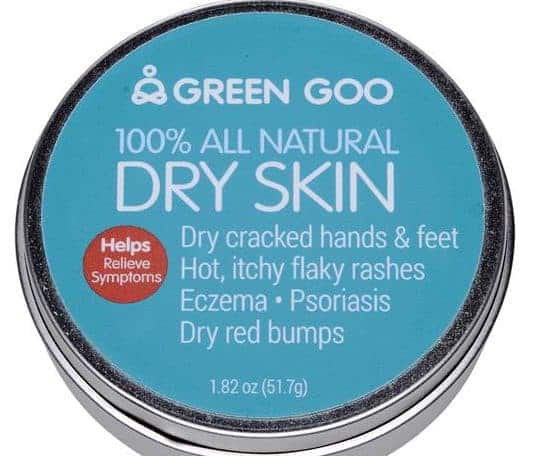
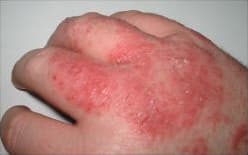 What Is Eczema?
What Is Eczema?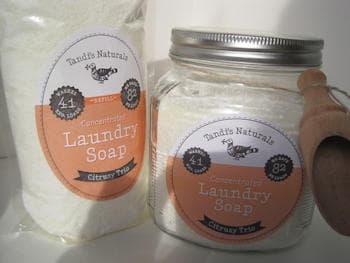
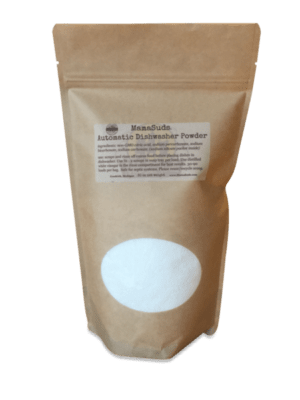
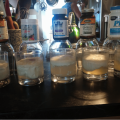
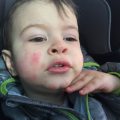




Pryce Berlin says
The Zoe organics balm has been working like a charm for my daughter’s eczema.
Carolyn says
I successfully treated my daughter’s eczema with Organic Coconut Oil. I first used a prescription cream to clear it up but the coconut oil kept it from coming back. She had it all over her body. The only continuing problem I have is her diaper area. Every time I put her in cloth diapers, she gets a rash on her upper thighs. No amount of coconut oil will help or prevent it. I’ve tried many different detergents to no avail. (You can’t use soap on cloth diapers.) The doc said it is eczema. It is raised, red, and very itchy. Certain disposable diapers cause a little rash but nothing serious. I prefer not to use disposables because I can’t afford the “good stuff” but no one can tell me why her legs get so inflamed. 🙁
MamaE says
If you look further into dczema and the root of it, it’s inflammation and in chinese medicine the bumps and oozing is caused by heat and the body pushing out a trigger/foreign substance like a virus. Inflammation can be caused by foods and different proteins such as dIry or grain – both are high in the inflammatory scale. Eliminating internal inflammatory triggers will also help external flare ups.
MamaE says
Sorry for the typos!
Heather says
Thoughts on Cal Ben’s products? The eczema solution recommends those products but I don’t see them mentioned at all on your site. What about Norwex? Thanks
Christian says
I thought Cal-Ben was great until I found out they use surfactants in their products. Basically they use a petroleum base. So I wouldn’t use it unless someone can tell that rubbing gas on my 1 yr old is good
Crystal says
I had really bad eczema on my hands. I would wake in the middle of the night and scratch until I bled. After reading this post I tried the shea butter I happened to have in my drawer. My hands cleared up overnight! The severe patch isn’t totally gone but is way reduced and on its way out!
Maia James says
Great to know! We just started carrying shea butter: https://gimmethegoodstuff.org/store/organic-essence-organic-shea-cream/
Stephanie Cole says
This natural eczema treatment for babies and kids are really helpful. Guardians should read this.
Bernice says
My daughter had struggled with eczema since she was a baby. She scratches so bad at her skin. We have used steroid creams, dermatologists and the usual triamcinolone. I decided to go the natural route and use the Made from Earth Pure Aloe Skin Treatment. This product has worked wonders and we only had it a few days.
With the Made from Earth Aloe Treatment, I saw saw results super fast and its not toxic like the steroid creams the dermatologist gave us which did not work!
theresa says
Can you share the link to this? My son just developed eczema on his legs and was prescribed a steriod too.
Thanks!
Jasmine says
I will change to natural products for eczema. My son is 2 months old and being so ignorant, put cortisone cream on him. Should I get nervous? I am literally shaking now!
Jasmine says
I will change to natural products for eczema. Maia, Suzanne, what do you think about Eczema Honey https://eczemahoneyco.com? First time mom here. My son is 2 months old and being so ignorant, put 1% cortisone cream on him . Should I get nervous? I am literally shaking & crying now! What is the worst to happen to him with all the bad parabens on it? He is only 2 months! Please help!
J. Ako says
Is this website/page still active? Been reading questions and interested to know the answers but no replies in here at all.
Rekonstrux says
Nice blog and according to me always go for those products which are natural because they are come with less side effects.
mulching paper supplier india says
Eczema can be happen normally in teens and infants. But by treating it on time is the best way to get rid of this.
Rekonstrux says
Nice and Thank you so much. I had treated my brother’s kid with this treatment.
Haier AC says
Your blog is very nice and I feel glad to know about the people who have time to share their experience to help others
Cat Socks says
No amount of coconut oil will help or prevent it. use something else like cooling your skin or other essential oils.
Rekonstrux says
Percentage of Kids Suffering from Eczema is increasing in present. Because of polluted environment this percentage is rapidly increasing. Your information is very helpful. Thanks.
mv agusta f3 review says
I also had bad Eczema problem on my face. I was in lot of pain and scratched myself every time. Your information is very helpful for people like me who faced all this or still facing this problem. Thanks for useful information.
Samantha says
Thanks for the article. It had some good information. I thought I would share about another product I really like for eczema on my son. Organic products have been really important to me and I’ve had a really good experience with Little Love Organics Sensitive Skin Soother as a spot treatment. It’s made for dry eczema prone skin and the ingredients are great. I also like the Babo Botanicals lotion, which has been really soothing as well.
Angelic says
Foderma eczema serum has been life changing for my daughter. As in infant, she started getting eczema. It was heartbreaking. She would scratch her skin to the point of bleeding at night at 10 months old. We tried every prescription- I hated putting steroid cream on my infant! Foderma serum cleared up her eczema completely. She is now almost 4 and we still use this religiously every night after her back and she has not had a breakout in years!
Alix says
Hi Maia,
Thank you so so much for everything you do, I love your website!
My daughter is 9 months and has eczema. I have been using coconut and zoe organic diaper balm (life saver in general for diaper rash) in affected area. My allergist recommended non scented cream and as a organic natural cream type of person, I am trying to find the best of the “one organic cream”.
For moisturizing, what do you think of Eucerin Baby Eczema relief body cream? It seems different than the usual Eucerin/cerave, etc.
Ingredients seems good, except phenoxyethanol? Would you say it is safe?
Thank you so much!
Alix
Active Ingredients
Colloidal Oatmeal 1% (Skin Protectant)
Inactive Ingredients
Water Glycerin Ricinus Communis (Castor) Seed Oil Mineral Oil Cetyl Alcohol Glyceryl Stearate Caprylic-Capric-Triglyceride Octyldodecanol Cetyl Palmitate PEG-40 Stearate Glycyrrhiza Inflata Root Extract Ceramide NP 1-2-Hexanediol Phenoxyethanol Piroctone Olamine Caprylyl Glycol Ethylhexylglycerin Benzyl Alcohol Citric Acid
Riann Will says
I’m definitely looking for things that are better for my baby’s skin, especially ones that are natural. This one sounds good for him. Thanks for sharing.
baking classes says
Thanks for these helpful tips. Very helpful for parents to keep there kids safe from eczema.